Unit3 How do you get to school ?Period 3 Section B(1a-1e)课件(21张PPT,无音频)
文档属性
| 名称 | Unit3 How do you get to school ?Period 3 Section B(1a-1e)课件(21张PPT,无音频) | 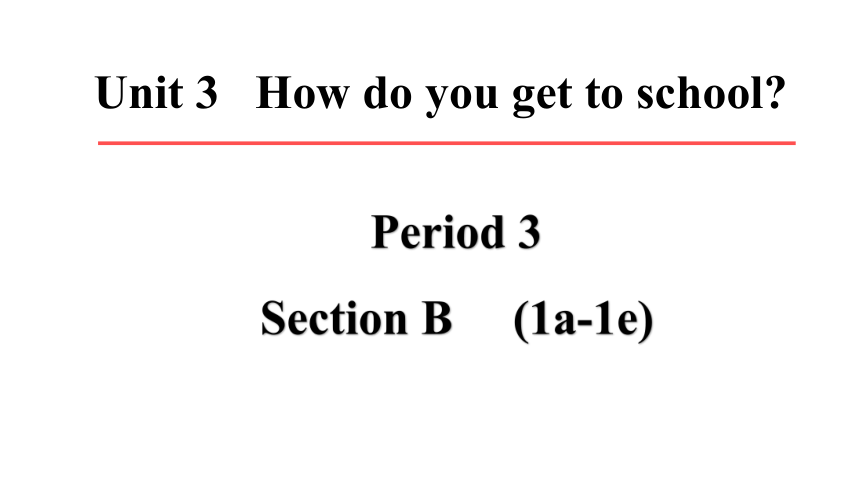 | |
| 格式 | pptx | ||
| 文件大小 | 18.3MB | ||
| 资源类型 | 教案 | ||
| 版本资源 | 人教新目标(Go for it)版 | ||
| 科目 | 英语 | ||
| 更新时间 | 2024-01-23 10:26:43 | ||
图片预览

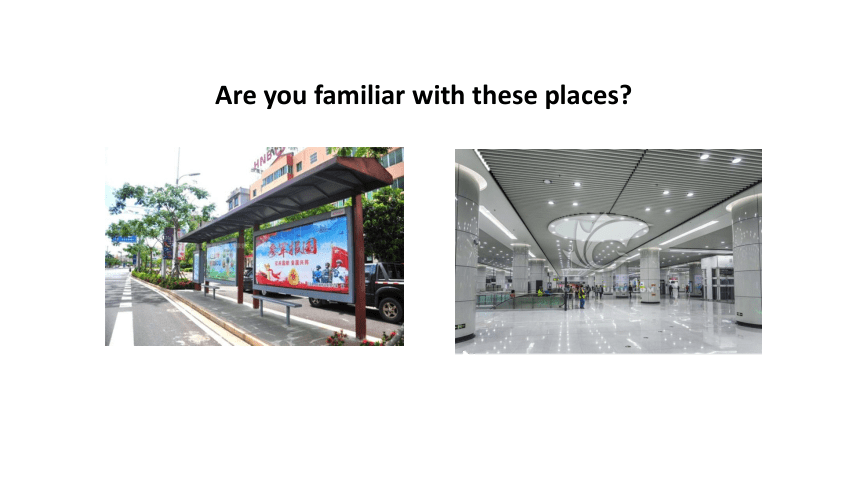
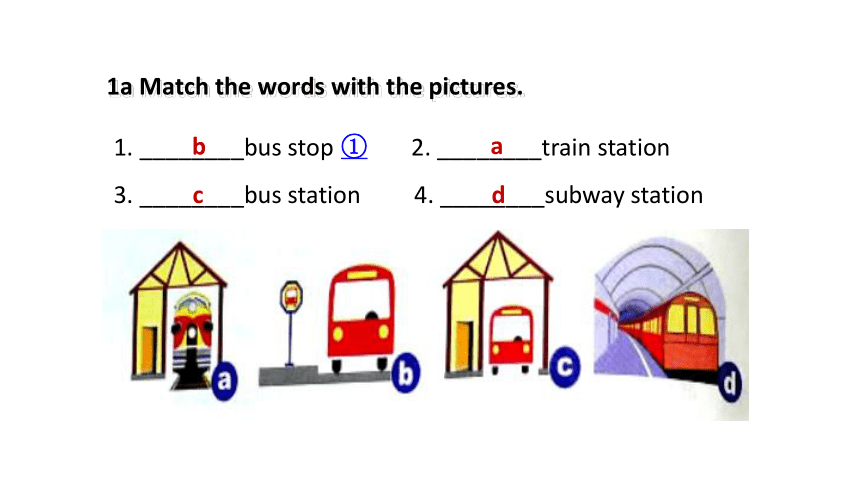
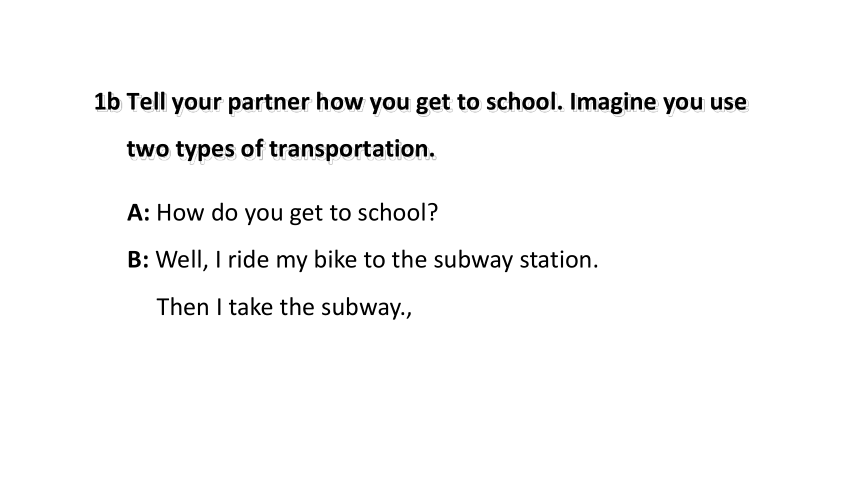
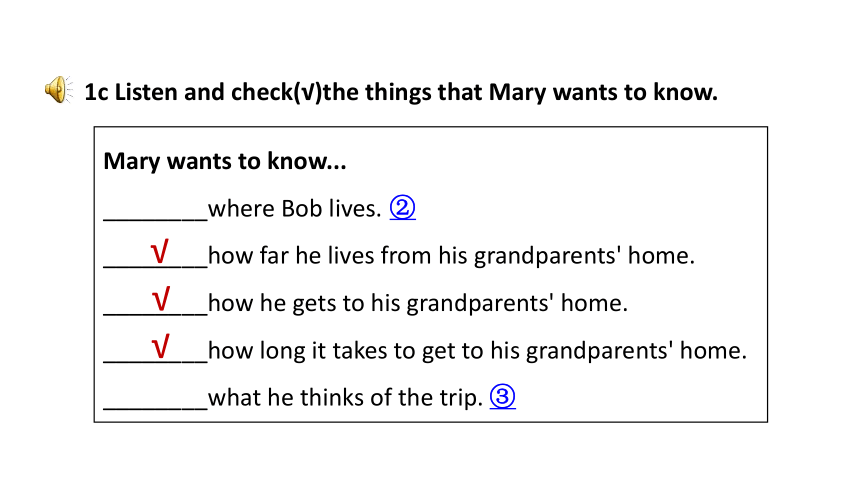
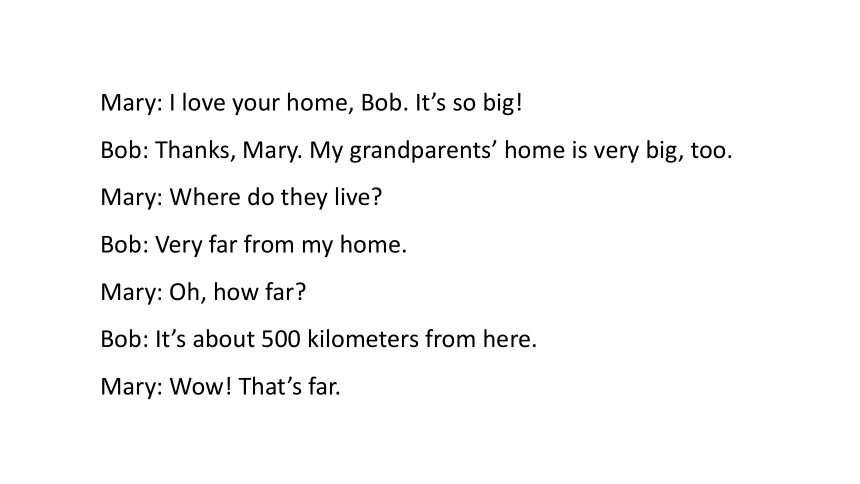
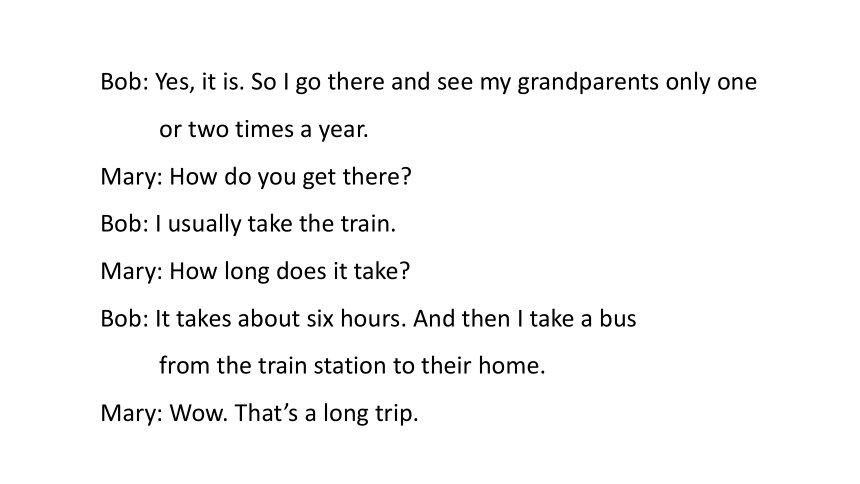
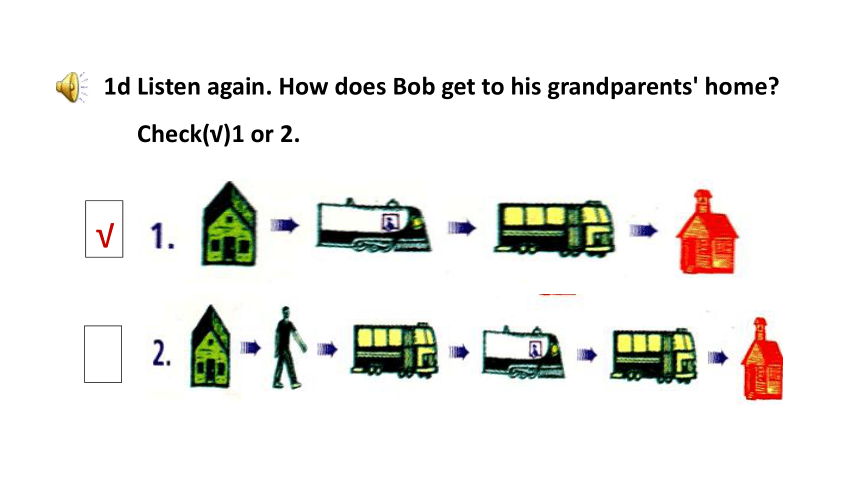
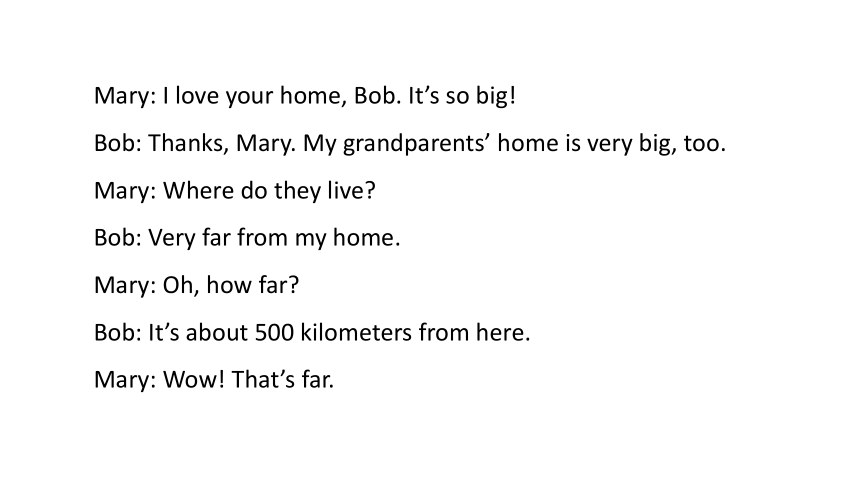
文档简介
(共21张PPT)
Period 3
Section B (1a-1e)
Unit 3 How do you get to school
Are you familiar with these places
1. ________bus stop ① 2. ________train station
3. ________bus station 4. ________subway station
b
a
c
d
1a Match the words with the pictures.
1b Tell your partner how you get to school. Imagine you use two types of transportation.
A: How do you get to school
B: Well, I ride my bike to the subway station.
Then I take the subway.,
1c Listen and check(√)the things that Mary wants to know.
Mary wants to know...
________where Bob lives. ②
________how far he lives from his grandparents' home.
________how he gets to his grandparents' home.
________how long it takes to get to his grandparents' home.
________what he thinks of the trip. ③
√
√
√
Mary: I love your home, Bob. It’s so big!
Bob: Thanks, Mary. My grandparents’ home is very big, too.
Mary: Where do they live
Bob: Very far from my home.
Mary: Oh, how far
Bob: It’s about 500 kilometers from here.
Mary: Wow! That’s far.
Bob: Yes, it is. So I go there and see my grandparents only one or two times a year.
Mary: How do you get there
Bob: I usually take the train.
Mary: How long does it take
Bob: It takes about six hours. And then I take a bus from the train station to their home.
Mary: Wow. That’s a long trip.
1d Listen again. How does Bob get to his grandparents' home Check(√)1 or 2.
√
Mary: I love your home, Bob. It’s so big!
Bob: Thanks, Mary. My grandparents’ home is very big, too.
Mary: Where do they live
Bob: Very far from my home.
Mary: Oh, how far
Bob: It’s about 500 kilometers from here.
Mary: Wow! That’s far.
Bob: Yes, it is. So I go there and see my grandparents only one or two times a year.
Mary: How do you get there
Bob: I usually take the train.
Mary: How long does it take
Bob: It takes about six hours. And then I take a bus from the train station to their home.
Mary: Wow. That’s a long trip.
1e Talk about how Bob gets to his grandparents' home.
—How does Bob get to his grandparents' home
—He…
①bus stop
stop /st p/ n. 车站;停止
stop 用作名词时的常见词组:at the bus stop 在公共汽车站;come to a stop 停下来。
考点1
考向
辨析: stop 与station
stop “车站”,一般指公共汽车在路上停留、乘客上下车的小站点。
station “车站”,规模较大的车站,一般指始发站和终点站。
e.g. The bus stop is not far from my home.
公共汽车停靠站离我家不远。
Many buses leave that big bus station.
许多公共汽车离开了那个大公共汽车站。
stop 用作动词时的常见用法:
① stop to do sth. 停下来去做某事
② stop doing sth. 停止做某事
③ stop sb. from doing sth. 阻止某人做某事
拓展:stop 既可作名词,也可作动词,意为“停止”。
e.g. The car comes to a stop. 汽车停了下来。
Let’s stop to have a rest.
咱们停下来(原来干的事),(去)休息一下吧。
Stop talking, please. 请停止(正在)说话(这个动作)。
His mother stops him from watching TV.
他妈妈阻止他看电视。
n . 停止
v . 停止
返回
考题1:—Tom, it’s time to go to bed. Stop ______ TV.
—OK, Mum.
A. watch B. watching C. to watch D. watches
【点拨】stop to do sth. 意为“停下来去做某事”,stop doing sth. 意为“停止做某事”。根据“it’s time to go to bed”可知,是指停止看电视。
B
②Mary wants to know where Bob lives.
宾语从句的语序
在含有宾语从句的主从复合句中,无论是陈述句还是疑问句,宾语从句都必须使用陈述句语序,疑问词位置不变。
e.g. He doesn’t know what his father’s favourite music is.
他不知道他父亲最喜欢的音乐是什么。
Do you know what Mr. Smith’s phone number is
你知道史密斯先生的电话号码是多少吗?
考点2
考向
宾语从句,作know 的宾语,是陈述句语序。
考题2:[怀化] —Jenny, do you know ________
—She is from Canada.
A. where is the woman in red from
B. where the woman in red is from
C. what the woman in red likes
【点拨】分析句子结构可知,此处是宾语从句,从句用陈述句语序,排除A 选项。结合答语“She is from Canada.”可知,询问来自哪里,用where询问。
B
返回
③...what he thinks of the trip.
think of 认为;想起
“What do you think of... ”意为“你认为……怎么样?”,相当于“How do you like... ?”,用来询问对某事、某物或某人的看法。回答时要说出具体的看法或意见。
e.g. —What do you think of the movie
= How do you like the movie 你觉得这部电影怎么样?
—It’s great. I love it. 太棒了。我喜欢。
考点3
think of 为固定短语,后可接名词、代词或动词的-ing 形式作宾语。
考向
拓展:think of 意为“想起”,与remember 同义。
e.g. This old picture lets him think of his good friend.
这张旧照片让他想起了他的好朋友。
We must think of/about the cost. 我们必须考虑成本。
think 的相关短语:
think highly of 高度评价;器重
think up 想出;发明
think back 回忆;回想
think out 仔细思考,全面考虑
think over 仔细思考,认真考虑
考题3:—________
—It’s very interesting.
A. What do you think of the book
B. Do you like the interesting book
C. Let’s go to watch a book.
D. How can you go to the book
A
考题4:—What’s up, Lisa
—I have to hand in the report tomorrow, but I can’t _______ anything to write.
A. talk of B. think of C. speak of D. hear of
【点拨】用语境判定法。由答语前半句“明天我必须交报告”可知,后面表示“但是我还没想起写什么”。Think of 意为“想起”。
B
返回
Period 3
Section B (1a-1e)
Unit 3 How do you get to school
Are you familiar with these places
1. ________bus stop ① 2. ________train station
3. ________bus station 4. ________subway station
b
a
c
d
1a Match the words with the pictures.
1b Tell your partner how you get to school. Imagine you use two types of transportation.
A: How do you get to school
B: Well, I ride my bike to the subway station.
Then I take the subway.,
1c Listen and check(√)the things that Mary wants to know.
Mary wants to know...
________where Bob lives. ②
________how far he lives from his grandparents' home.
________how he gets to his grandparents' home.
________how long it takes to get to his grandparents' home.
________what he thinks of the trip. ③
√
√
√
Mary: I love your home, Bob. It’s so big!
Bob: Thanks, Mary. My grandparents’ home is very big, too.
Mary: Where do they live
Bob: Very far from my home.
Mary: Oh, how far
Bob: It’s about 500 kilometers from here.
Mary: Wow! That’s far.
Bob: Yes, it is. So I go there and see my grandparents only one or two times a year.
Mary: How do you get there
Bob: I usually take the train.
Mary: How long does it take
Bob: It takes about six hours. And then I take a bus from the train station to their home.
Mary: Wow. That’s a long trip.
1d Listen again. How does Bob get to his grandparents' home Check(√)1 or 2.
√
Mary: I love your home, Bob. It’s so big!
Bob: Thanks, Mary. My grandparents’ home is very big, too.
Mary: Where do they live
Bob: Very far from my home.
Mary: Oh, how far
Bob: It’s about 500 kilometers from here.
Mary: Wow! That’s far.
Bob: Yes, it is. So I go there and see my grandparents only one or two times a year.
Mary: How do you get there
Bob: I usually take the train.
Mary: How long does it take
Bob: It takes about six hours. And then I take a bus from the train station to their home.
Mary: Wow. That’s a long trip.
1e Talk about how Bob gets to his grandparents' home.
—How does Bob get to his grandparents' home
—He…
①bus stop
stop /st p/ n. 车站;停止
stop 用作名词时的常见词组:at the bus stop 在公共汽车站;come to a stop 停下来。
考点1
考向
辨析: stop 与station
stop “车站”,一般指公共汽车在路上停留、乘客上下车的小站点。
station “车站”,规模较大的车站,一般指始发站和终点站。
e.g. The bus stop is not far from my home.
公共汽车停靠站离我家不远。
Many buses leave that big bus station.
许多公共汽车离开了那个大公共汽车站。
stop 用作动词时的常见用法:
① stop to do sth. 停下来去做某事
② stop doing sth. 停止做某事
③ stop sb. from doing sth. 阻止某人做某事
拓展:stop 既可作名词,也可作动词,意为“停止”。
e.g. The car comes to a stop. 汽车停了下来。
Let’s stop to have a rest.
咱们停下来(原来干的事),(去)休息一下吧。
Stop talking, please. 请停止(正在)说话(这个动作)。
His mother stops him from watching TV.
他妈妈阻止他看电视。
n . 停止
v . 停止
返回
考题1:—Tom, it’s time to go to bed. Stop ______ TV.
—OK, Mum.
A. watch B. watching C. to watch D. watches
【点拨】stop to do sth. 意为“停下来去做某事”,stop doing sth. 意为“停止做某事”。根据“it’s time to go to bed”可知,是指停止看电视。
B
②Mary wants to know where Bob lives.
宾语从句的语序
在含有宾语从句的主从复合句中,无论是陈述句还是疑问句,宾语从句都必须使用陈述句语序,疑问词位置不变。
e.g. He doesn’t know what his father’s favourite music is.
他不知道他父亲最喜欢的音乐是什么。
Do you know what Mr. Smith’s phone number is
你知道史密斯先生的电话号码是多少吗?
考点2
考向
宾语从句,作know 的宾语,是陈述句语序。
考题2:[怀化] —Jenny, do you know ________
—She is from Canada.
A. where is the woman in red from
B. where the woman in red is from
C. what the woman in red likes
【点拨】分析句子结构可知,此处是宾语从句,从句用陈述句语序,排除A 选项。结合答语“She is from Canada.”可知,询问来自哪里,用where询问。
B
返回
③...what he thinks of the trip.
think of 认为;想起
“What do you think of... ”意为“你认为……怎么样?”,相当于“How do you like... ?”,用来询问对某事、某物或某人的看法。回答时要说出具体的看法或意见。
e.g. —What do you think of the movie
= How do you like the movie 你觉得这部电影怎么样?
—It’s great. I love it. 太棒了。我喜欢。
考点3
think of 为固定短语,后可接名词、代词或动词的-ing 形式作宾语。
考向
拓展:think of 意为“想起”,与remember 同义。
e.g. This old picture lets him think of his good friend.
这张旧照片让他想起了他的好朋友。
We must think of/about the cost. 我们必须考虑成本。
think 的相关短语:
think highly of 高度评价;器重
think up 想出;发明
think back 回忆;回想
think out 仔细思考,全面考虑
think over 仔细思考,认真考虑
考题3:—________
—It’s very interesting.
A. What do you think of the book
B. Do you like the interesting book
C. Let’s go to watch a book.
D. How can you go to the book
A
考题4:—What’s up, Lisa
—I have to hand in the report tomorrow, but I can’t _______ anything to write.
A. talk of B. think of C. speak of D. hear of
【点拨】用语境判定法。由答语前半句“明天我必须交报告”可知,后面表示“但是我还没想起写什么”。Think of 意为“想起”。
B
返回
同课章节目录
- Unit 1 Can you play the guitar?
- Section A
- Section B
- Unit 2 What time do you go to school?
- Section A
- Section B
- Unit 3 How do you get to school?
- Section A
- Section B
- Unit 4 Don't eat in class.
- Section A
- Section B
- Unit 5 Why do you like pandas?
- Section A
- Section B
- Unit 6 I'm watching TV.
- Section A
- Section B
- Review of Units 1-6
- Unit 7 It's raining!
- Section A
- Section B
- Unit 8 Is there a post office near here?
- Section A
- Section B
- Unit 9 What does he look like?
- Section A
- Section B
- Unit 10 I'd like some noodles.
- Section A
- Section B
- Unit 11 How was your school trip?
- Section A
- Section B
- Unit 12 What did you do last weekend?
- Section A
- Section B
